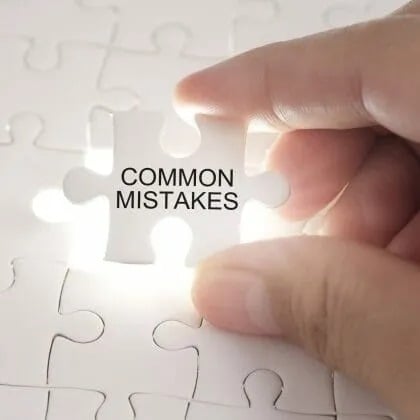Four Big Retirement Blunders

It’s too bad, but financial advisers see these four mistakes all the time. Don’t fall into the same traps.
Despite the chatter you’ve probably overheard through the years — at work, family gatherings or neighborhood barbecues — few people actually know as much about retirement planning as they think they do.
Sure, your buddy might know a thing or two about stocks and bonds, or the pros and cons of annuities. And your sister-in-law may have done some thorough research about getting the most from Medicare.
Don’t want to downplay their diligence. But the advice they’re likely offering you just isn’t enough. For one thing, what worked for them might not be the right thing for you. And — just as significantly — they’re undoubtedly skipping over some really important stuff.
How can we be so sure? Because we have seen people make the same costly blunders again and again when it comes to retirement planning. They didn’t know what they didn’t know, so they never saw the big risks coming.
The thing is, you can avoid these common mistakes — or, at least, be prepared for them. Here are the four we see most often:
Blunder No. 1: Not Giving Social Security Enough Respect
Social Security serves as one of the most important income sources for many retirees. According to the Social Security Administration (SSA), among elderly Social Security beneficiaries, 50% of married couples and 70% of unmarried persons receive 50% or more of their income from Social Security. Yet, retirees often don’t put much effort into deciding when they’ll file for those much-needed benefits.
In a 2019 report by the Retirement and Disability Research Center at the University of Michigan, 22% of the retirees sampled said they regretted claiming their Social Security benefits when they did (with 20% saying they should have claimed them later).
How and when you begin taking your benefits is a critical decision — even for higher earners. If you’re married, your choices might affect your surviving spouse someday. We can help guide you to the correct social security optimization and filing strategy.
The friendly folks at your local SSA office aren’t authorized to make claiming recommendations. And not all financial professionals are experts on this topic. But I think you’ll find it’s worth your time to talk to us about this.

Blunder No. 2: Ignoring Sequence of Returns Risk
If you plan to use money invested in the market as a source of retirement income, this is the monster in the closet. Most people I talk to have never heard of sequence of returns risk, even if they’re working with an investment adviser or broker.
Here’s what it is and why it matters: Upon retirement you no longer add money to your retirement account. Instead, you begin taking withdrawals. If your money is in the market, these market returns become critical to maintaining a reliable retirement income stream. If stocks are at a low because of a big correction or crash, you are pulling money from shrinking accounts, which could significantly reduce the longevity of your plan.
When that correction or crash comes early in retirement, or just before you get there, it can seriously derail your plans. For one thing, that’s typically when you have the largest balances in your accounts, therefore the greatest exposure to a major loss. And even when the market recovers, you might not recover with it.
Fortunately, there are ways to minimize the damage sequence of returns risk can cause. You might find, for example, that it makes sense to reduce your exposure to volatility with a more conservative portfolio mix. We can help you put together the proper investment mix. A well-thought-out, prudent retirement income plan should provide protections and flexibility when the markets are acting up.
Whatever you do, don’t take this threat lightly.

Blunder No. 3: Not Having a Plan for Future Long-Term Health Care Costs
According to the U.S. Department of Health and Human Services, a person who turns 65 today has about a 70% chance of needing some type of long-term care services and support later on. Most married couples think they will provide this care for each other, but that isn’t always possible and it can devastate the health of a caregiver who isn’t physically or emotionally equipped to deal with a loved one’s needs.
The good news is that there are several solutions, including fixed-indexed annuities, Long term care insurance and life insurance plans that offer cash values and accelerated death benefits. The annuities today have more flexibility and options and are a good option in your plan. Many retirees think they don’t need life insurance once they reach a certain age, but there are benefits to be had. We can work with to choose the right products for your needs.
Blunder No. 4: Leaving IRA & 401K Money to Heirs
Individual Retirement Accounts (IRAs) are, by their very nature, meant to be depleted over the account owner’s lifetime. Indeed, the IRS encourages it. Even if you don’t want or need to withdraw the money during your retirement, you must take required minimum distributions (RMDs) every year starting at age 72. But what if you don’t empty the account and, instead, leave the money behind for your children?
Due to recent changes in the tax laws, your kids will have just 10 years to empty the account and they’ll pay taxes based on their tax bracket at the time they make those withdrawals, not your tax bracket. If they happen to be in their highest-earning years (which is often the case), a large chunk of the money your children would have enjoyed could end up going to the IRS.
If you’ve socked away the bulk of your savings in a tax-deferred account (a 401(k), 403(b), traditional IRA, etc.) you aren’t stuck. During your lifetime, there are ways you can change taxable dollars into nontaxable dollars, such as a Roth IRA conversion. For your past 401k's/403b's, that are getting hit by high fees and risk, they can be rolled over into better investment vehicle.
Pursuing your retirement dreams is challenging enough without making these common blunders. As you listen to others’ tips and tales, keep in mind that real knowledge is power. Don’t hesitate to ask for professional guidance when designing your retirement income and retirement tax plans.
Contact me at [email protected].
Check out our website at www.retirewisepro.com
Sources/Contributors: Kiplinger, Dan Brooks, Kim Franke-Folstad & Shawn Maloney






